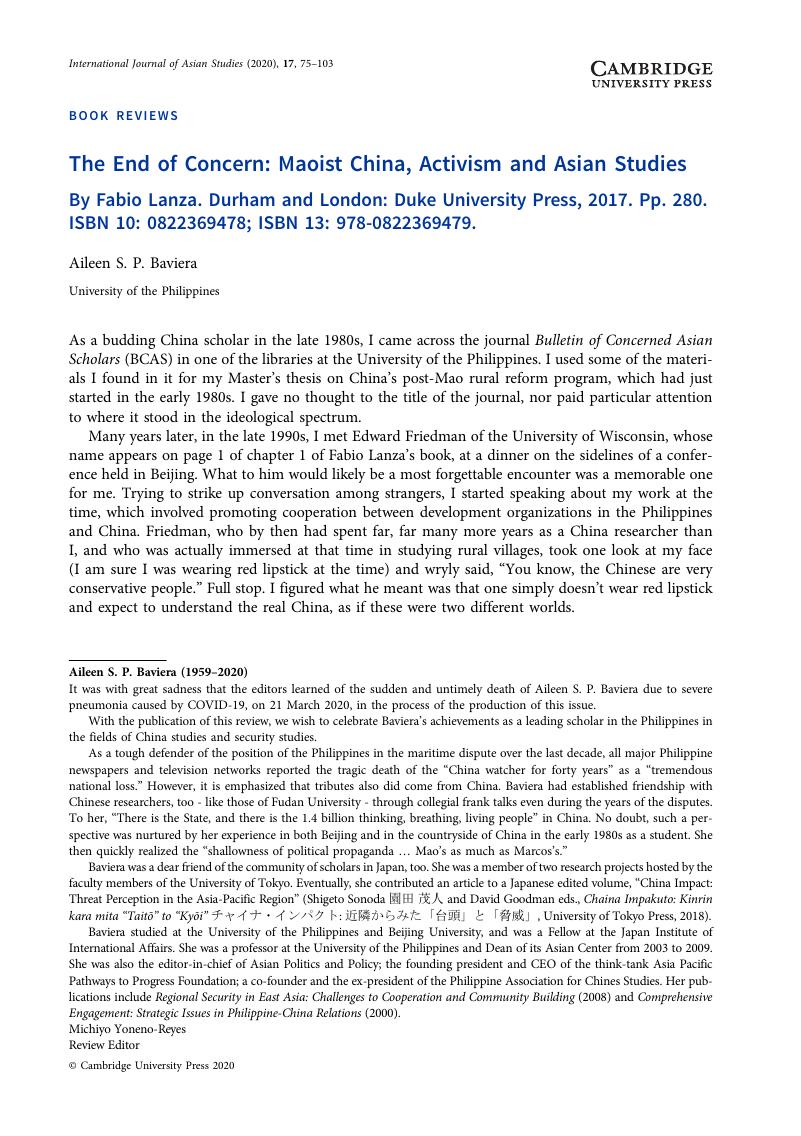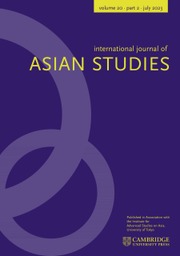No CrossRef data available.
The End of Concern: Maoist China, Activism and Asian Studies By Fabio Lanza. Durham and London: Duke University Press, 2017. Pp. 280. ISBN 10: 0822369478; ISBN 13: 978-0822369479.
Published online by Cambridge University Press: 27 April 2020
Abstract

- Type
- Book Reviews
- Information
- Copyright
- Copyright © Cambridge University Press 2020
Footnotes
Aileen S. P. Baviera (1959–2020)
It was with great sadness that the editors learned of the sudden and untimely death of Aileen S. P. Baviera due to severe pneumonia caused by COVID-19, on 21 March 2020, in the process of the production of this issue.
With the publication of this review, we wish to celebrate Baviera's achievements as a leading scholar in the Philippines in the fields of China studies and security studies.
As a tough defender of the position of the Philippines in the maritime dispute over the last decade, all major Philippine newspapers and television networks reported the tragic death of the “China watcher for forty years” as a “tremendous national loss.” However, it is emphasized that tributes also did come from China. Baviera had established friendship with Chinese researchers, too - like those of Fudan University - through collegial frank talks even during the years of the disputes. To her, “There is the State, and there is the 1.4 billion thinking, breathing, living people” in China. No doubt, such a perspective was nurtured by her experience in both Beijing and in the countryside of China in the early 1980s as a student. She then quickly realized the “shallowness of political propaganda … Mao's as much as Marcos's.”
Baviera was a dear friend of the community of scholars in Japan, too. She was a member of two research projects hosted by the faculty members of the University of Tokyo. Eventually, she contributed an article to a Japanese edited volume, “China Impact: Threat Perception in the Asia-Pacific Region” (Shigeto Sonoda 園田 茂人 and David Goodman eds., Chaina Impakuto: Kinrin kara mita “Taitō” to “Kyōi” チャイナ・インパクト: 近隣からみた「台頭」と「脅威」, University of Tokyo Press, 2018).
Baviera studied at the University of the Philippines and Beijing University, and was a Fellow at the Japan Institute of International Affairs. She was a professor at the University of the Philippines and Dean of its Asian Center from 2003 to 2009. She was also the editor-in-chief of Asian Politics and Policy; the founding president and CEO of the think-tank Asia Pacific Pathways to Progress Foundation; a co-founder and the ex-president of the Philippine Association for Chines Studies. Her publications include Regional Security in East Asia: Challenges to Cooperation and Community Building (2008) and Comprehensive Engagement: Strategic Issues in Philippine-China Relations (2000).
Michiyo Yoneno-Reyes
Review Editor




